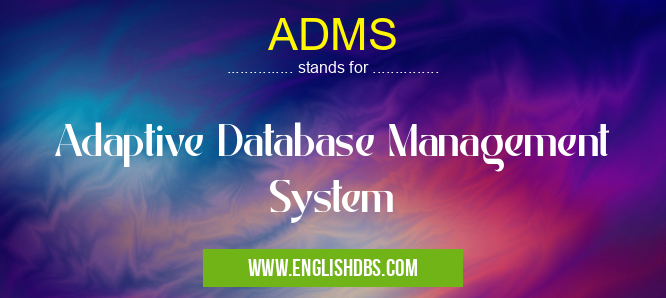What does ADMS mean in DATABASES
ADMS, or Adaptive Database Management System, is a data management system designed to be adaptive and evolve with the ever-changing needs of the organization it supports. This type of technology operates in the background, modifying how data is tracked and stored in order to improve efficiency and accuracy. ADMS systems can also be used to analyze data, identify trends, generate reports, and even offer critical recommendations for optimization. By streamlining databases and providing an ever-evolving resource for information retrieval and accuracy, ADMS brings greater value to organizations looking to maximize their data management capabilities.

ADMS meaning in Databases in Computing
ADMS mostly used in an acronym Databases in Category Computing that means Adaptive Database Management System
Shorthand: ADMS,
Full Form: Adaptive Database Management System
For more information of "Adaptive Database Management System", see the section below.
Definition
Adaptive Database Management Systems (ADMS) are computerized systems that update themselves so they can meet changing user requirements while managing database operations efficiently. It is designed to enable organizations to have access to up-to-date information about their operations. The technology allows users to store data more securely than ever by using an agile model of database updates which are automatically triggered whenever relevant changes occur within the system.
Benefits
The primary benefit of an Adaptive Database Management System is its ability to adapt to the ever-changing needs of an organization. With this type of system in place, administrators can easily manage large databases by dynamically changing configuration settings without having to manually update every field or record. Another advantage is that ADMS can provide insights and analysis far beyond what a traditional database might offer due to its ability to adjust SQL query parameters on demand and run sophisticated queries against multiple fields at once. Further advantages include improved scalability through automated workload distribution as well as better performance through indexing for faster search results.
Essential Questions and Answers on Adaptive Database Management System in "COMPUTING»DB"
What is an adaptive database management system?
An adaptive database management system (ADMS) is a data management technology that utilizes artificial intelligence, machine learning and other advanced technologies to improve the performance, scalability, and reliability of existing databases. ADMS allows it's users to dynamically change database structures without requiring manual coding or additional programming.
How does an Adaptive Database Management System function?
An ADMS functions by tracking user interactions with the database and using this data to optimize the overall performance. It uses artificial intelligence algorithms to detect anomalies and adjust the parameters of the database according to these insights in order to optimize read/write speed, accuracy and scalability.
What are some of the benefits of using an Adaptive Database Management System?
Some of the key benefits of using an ADMS include improved scalability due to automatic scaling up or down depending on current usage; improved read/write speed due to dynamic optimization; reduced resource costs due to fewer server instances necessary; reduced risk of security breaches due to enhanced security features; and increased efficiency due to automated maintenance tasks such as index tuning, table re-partitioning, etc.
What types of databases is an Adaptive Database Management System suitable for?
An adaptive database management system is a great solution for any relational, NoSQL or Graph databases. It can be used with both traditional databases such as Oracle or Microsoft SQL Server as well as open source solutions such as PostgreSQL or MongoDB.
How can I get started with using an Adaptive Database Management System?
To get started with using anAdaptive Database Management System you should first assess your current needs – what type of databases do you currently use?, what level of scalability do you require?, etc. Once you have identified your requirements you can then find a suitable software solution that offers tailored options for managing your specific data needs.
How secure is an Adaptive Database Management System?
Security is paramount when it comes to managing sensitive data so many adaptive database management systems have been designed with comprehensive security measures in place - from authentication methods through encryption tools right up to access control protocols that limit user access rights where required.
How quickly can I expect results from my Adaptive Database Management System?
The exact timeframe depends largely on how much data has been collected by the system prior to deployment but generally ADMS should be able to provide results within hours – sometimes even minutes - from initial deployment. This makes them perfect for organisations who need quick insight into their data sets without sacrificing performance or reliability.
Is there any danger associated with using an Adaptive Database Management System?
As with any pieces of software there is always a risk that something could go wrong however most reputable ADMS providers will have multiple layers of safety protocols in place in order prevent data loss or accidental changes being made within their systems - often including real-time monitoring and backup solutions should anything unexpected occur.
Are there any extra costs associated with using an Adaptive Database Management System?
Generally speaking most ADMS providers will charge a base fee which covers installation, training etc but then offer further options for more advanced features which may be charged separately e.g subscription based pricing plans for larger datasets or cloud hosting solutions etc.
Final Words:
In conclusion, Adaptive Database Management Systems are highly beneficial for any business utilizing large databases as they are able maximize efficiency, security, scalability and performance on demand without being bogged down by manual updates or complex queries. These systems have become increasingly popular over time due having a wide range of benefits for those willing make use of them which makes them ideal for companies looking optimize their IT environment in a fast moving technological landscape.
ADMS also stands for: |
|
| All stands for ADMS |
